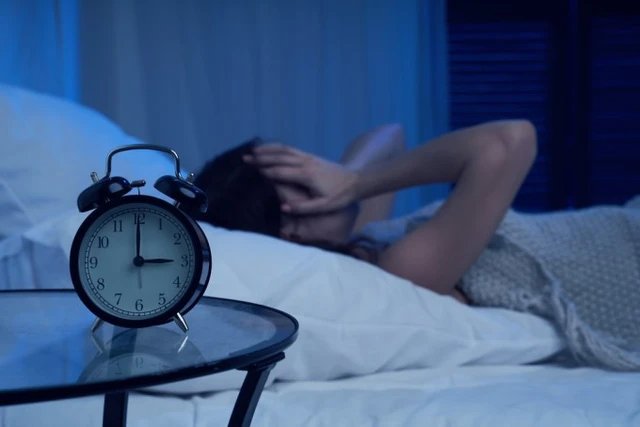Many sleep disorders manifest with both insomnia and excessive daytime sleepiness (EDS).
Definitions of Insomnia and EDS
Insomnia refers to difficulty initiating or maintaining sleep, waking up too early, or feeling unrested despite sleep.
EDS is the condition of falling asleep during normal waking hours. Insomnia can be a disorder on its own, even appearing alongside other conditions, or it can be a symptom of other disorders. EDS, on the other hand, is not a disorder itself but a symptom of various sleep-related disorders.
Types of Insomnia
Difficulty falling asleep (sleep-onset insomnia) should be distinguished from difficulty maintaining sleep and waking up early (sleep-maintenance insomnia) due to different causes. Sleep-onset insomnia may suggest delayed sleep phase syndrome, chronic psychophysiological insomnia, restless legs syndrome, or childhood anxieties. Sleep-maintenance insomnia may suggest major depression, central sleep apnea, obstructive sleep apnea, periodic limb movement disorder, or aging. Falling asleep early and waking up early may suggest advanced sleep phase syndrome.
Internal and External Factors Influencing Sleep Disorders
Sleep disorders can be due to internal (intrinsic) or external (extrinsic) factors.
Unhealthy Personal Habits
Sleep can be affected by certain behaviors. These include:
- Use of Caffeine or Other Stimulants: Particularly close to bedtime, even in the afternoon for sensitive patients.
- Excessive Exercise or Excitement: For example, watching an engaging TV show late in the evening.
- Irregular Sleep Schedule: Patients who compensate for sleep deprivation by sleeping in late or taking long naps might disrupt their nighttime sleep.
Patients with insomnia should adhere to a regular wake-up time and avoid long naps during the day that exceed their nighttime sleep duration.
Importance of Sleep Hygiene
/https://cms-prod.s3-sgn09.fptcloud.com/mat_ngu_keo_dai_1_bfea3bc69a.jpg)
Proper sleep hygiene can improve sleep quality.
Sleep Adjustment Disorders
Sudden emotional stress (e.g., job loss, hospitalization, a death in the family) can cause insomnia. Symptoms usually subside as the stress diminishes; insomnia is often transient and brief. However, if daytime sleepiness and fatigue occur, particularly if they impact daytime functioning, it is recommended to use sleeping pills at bedtime for a short period. Anxiety may also require specific treatment.
Psychophysiological Insomnia
Insomnia, regardless of the cause, can persist even after controlling the precipitating factors, often because patients become anxious about another sleepless night and the resulting fatigue the next day. Typically, patients spend hours in bed focusing and worrying about their insomnia, finding it harder to sleep in their own room than away from home.
Optimal treatment combines:
- Cognitive-Behavioral Strategies
- Sleep Medications
Cognitive-behavioral strategies are more difficult to implement and take longer to show effects, but they have longer-lasting benefits after treatment ends.
These strategies include:
- Sleep Hygiene: Especially limiting time spent in bed.
- Education
- Relaxation Training
- Stimulus Control
- Cognitive Therapy
Sleep medications are suitable for patients needing quick treatment when their insomnia significantly affects daytime functioning, such as causing excessive sleepiness and fatigue. These medications are not intended for indefinite use in most cases.
Insomnia Related to Physical Disorders
Physical conditions can interfere with sleep, leading to insomnia and EDS. Conditions causing pain or discomfort (e.g., arthritis, cancer, herniated discs), especially those that worsen with movement, cause brief awakenings and poor sleep quality. Nocturnal seizures can also disrupt sleep.
Treating the underlying condition and symptoms (e.g., taking painkillers before bedtime) can improve sleep.
Insomnia Related to Mental Disorders

Most primary mental disorders can cause insomnia and EDS. About 80% of patients with major depression complain of these symptoms. Conversely, 40% of chronic insomnia patients have severe mental disorders, often mood disorders.
Depressed patients may experience insomnia due to difficulty falling asleep or maintaining sleep. In some cases, during bipolar disorder or seasonal affective disorder phases, sleep is not interrupted, but patients complain of unrelenting daytime fatigue.
If depression is accompanied by insomnia, sedating antidepressants (e.g., citalopram, paroxetine, mirtazapine) can help patients sleep. These medications are typically used regularly at low doses to treat depression. However, clinicians should be aware that these medications do not necessarily induce sleep and may have stimulating properties. Additionally, sedatives may have prolonged effects beyond their therapeutic window, causing EDS, and they may have other side effects like weight gain. Any antidepressant may also be used in conjunction with a sleep aid.
If depression is accompanied by EDS, activating antidepressants (e.g., bupropion, venlafaxine, certain SSRIs like fluoxetine and sertraline) may be selected.
Sleep Deprivation Syndrome
Patients with sleep deprivation syndrome do not get enough sleep at night to stay alert when awake. The cause is usually social or work-related issues. This syndrome may be the most common cause of EDS, which disappears when sleep time increases (e.g., on weekends or holidays). After prolonged sleep deprivation, patients may need weeks or months of extra sleep to restore daytime alertness.
Medication-Induced Sleep Disorders
Insomnia and EDS can result from the long-term use of central nervous system (CNS) stimulants (e.g., amphetamines, caffeine), sleeping pills (e.g., benzodiazepines), other sedatives, anti-metabolite chemotherapy, anticonvulsants (e.g., phenytoin), methyldopa, propranolol, alcohol, and thyroid hormone preparations (see the table “Some Medications That Cause Sleep Difficulties”). Commonly prescribed oral medications can cause discomfort, lethargy, and reduced alertness. Many psychotropic drugs can cause abnormal movements during sleep.
Insomnia can also occur during the withdrawal of CNS depressants (e.g., barbiturates, opioids, sedatives), tricyclic antidepressants, monoamine oxidase inhibitors, or illicit drugs (e.g., cocaine, heroin, cannabis, phencyclidine). Abrupt cessation of sleeping pills or sedatives can cause anxiety, tremors, and seizures.




